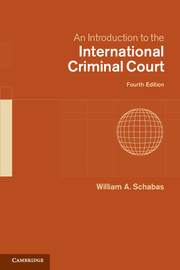Book contents
- Frontmatter
- Contents
- Preface
- List of abbreviations
- 1 Creation of the Court
- 2 The Court becomes operational
- 3 Jurisdiction
- 4 Triggering the jurisdiction
- 5 Admissibility
- 6 General principles of criminal law
- 7 Investigation and pre-trial procedure
- 8 Trial and appeal
- 9 Punishment
- 10 Victims of crimes and their concerns
- 11 Structure and administration of the Court
- Appendices
- Bibliography
- Index
- References
6 - General principles of criminal law
- Frontmatter
- Contents
- Preface
- List of abbreviations
- 1 Creation of the Court
- 2 The Court becomes operational
- 3 Jurisdiction
- 4 Triggering the jurisdiction
- 5 Admissibility
- 6 General principles of criminal law
- 7 Investigation and pre-trial procedure
- 8 Trial and appeal
- 9 Punishment
- 10 Victims of crimes and their concerns
- 11 Structure and administration of the Court
- Appendices
- Bibliography
- Index
- References
Summary
The statutes of the Nuremberg and Tokyo tribunals, as well as those of the ad hoc tribunals for the former Yugoslavia and Rwanda, are very thin when it comes to what criminal lawyers call ‘general principles’. Once the crimes were defined, the drafters of these earlier models left issues such as the appreciation of the evidence or the assessment of responsibility for accomplices and other ‘secondary’ offenders to the discretion of the judges. After all, those appointed to preside over these tribunals were eminent jurists in their own countries and could draw on a rich, multicultural resource of domestic criminal law practice. The Rome Statute is far less generous to the judges. It seeks to delimit in great detail any possible exercise of judicial discretion. Part 3 of the Statute, consisting of Articles 22–33, is entitled ‘General principles of criminal law’. It directs the Court on such issues as criminal participation, the mental element of crimes and the availability of various defences. But elsewhere in the Statute can be found other provisions that are also germane to the issue of general principles. They present a fascinating experiment in comparative criminal law, drawing upon elements from the common law, the Romano-Germanic system, Sharia law and other regimes of penal justice.
Sources of law
Article 21 of the Rome Statute, entitled ‘Applicable law’, sets out the legal sources upon which the International Criminal Court may draw.
- Type
- Chapter
- Information
- An Introduction to the International Criminal Court , pp. 206 - 248Publisher: Cambridge University PressPrint publication year: 2011



